A long time ago, it was a dream of mine to write for cloud computing platforms.
Now, you can find my work on Akamai Cloud, DigitalOcean, Alibaba Cloud (need your own Counter-Strike server?). I also contributed some light blogging in the past: MakeTechEasier, Software Informer. But what I enjoyed most was posting to KodeKloud's Quora page, growing it it to 2.8 million views, and making it the #1 most-viewed profile on Quora for Linux topics, while I was actively posting.
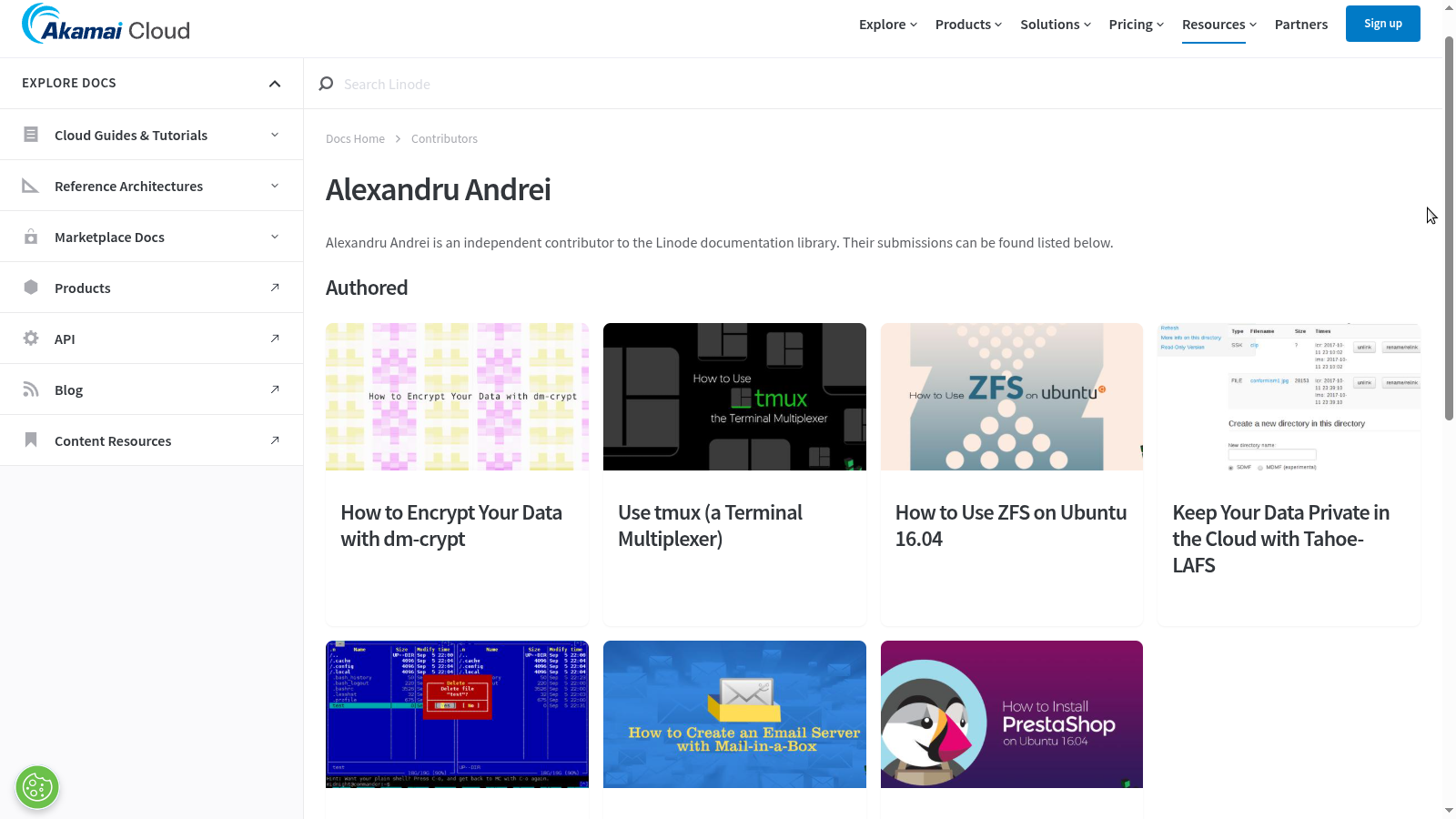
I love Linux, and servers. They're pure magic! As they give you the freedom to build anything you can imagine.
Freelancing is similar. It gives you freedom. It lets you create your own job. Set your own terms, and working hours. Pick the projects you like, and so on.
Looking back, it's pretty wild that I started freelancing before the year 2000 (around 1999, if I remember right). I don't think there even was a name for it; at least in my country. It was called something like "free professional" around here. But you didn't hear that term often. And it wasn't considered a viable career path.
But in 2001 I started to see the potential. I began helping local individuals, then local businesses. I was able to earn "just enough" money after a while. And it became second nature to meet with a new client, discuss details, and shake hands.
Maybe it's easier for a client to trust you, when they can meet face to face.
Moving from offline to online freelancing was much harder. At least at the beginning. Now? It's easy.
Everything you'll read here is what helped me get to the easy part. It took me years to learn all of this. But you can speed-run it, and learn practical freelancing tips in 30 minutes! Things you can actually start to apply today.
What You Will Learn
Here's a summary of the freelancing insider secrets you'll get in this blog:
- How to overcome the biggest problem of them all: Landing your first project on a freelancing website. The solution to the "no reviews, no portfolio" problem.
- The secret method to immediately identify high-quality clients vs. low-quality clients. It really is easy, and quick.
- The above includes how to identify "cheap" clients that severely underpay freelancers (e.g., they pay less than 10% of what the project is really worth). And you can do this even if they lie in their project's budget.
- How to target projects where clients will respond more often. Sick of applying to projects, and getting no responses? This will help.
- How to tell your potential clients what they need to hear. List solutions, not skills.
And a few bonus insights, like:
- Why low prices actually hurt you. You might think low prices help to "convince clients" to pick you. But this only attracts the wrong type of client.
- How doing something you love will actually help you become better at your work. And, in time, earn you more money.
- Dispelling the myth that clients don't notice your effort, and quality. And explaining why high-quality clients always notice high-effort, high-quality work. This matters. Understanding this will motivate you to keep pushing for that high-quality work. And it pays off, because it will get you the right type of client that you actually enjoy working with.
All of these tips will help steer your freelancing career in the right direction. So that instead of a struggle it becomes an interesting, and satisfying journey.
How to Land Your First Freelance Job When You Have No Reviews, or Portfolio
If you're just starting out, you may already know how it is. You apply to project after project, but no response, right? Well, don't get discouraged. That's actually normal. Don't, even for a second, think it's a problem with you.
Even if you have the skills, landing that first job is super hard. It's the hardest part actually. The good news? Things start to get easier after you land your first project.
Do you know why it's hard to get your first client to respond? First impressions actually matter.
Think about their perspective. What do they see when you apply to their project?
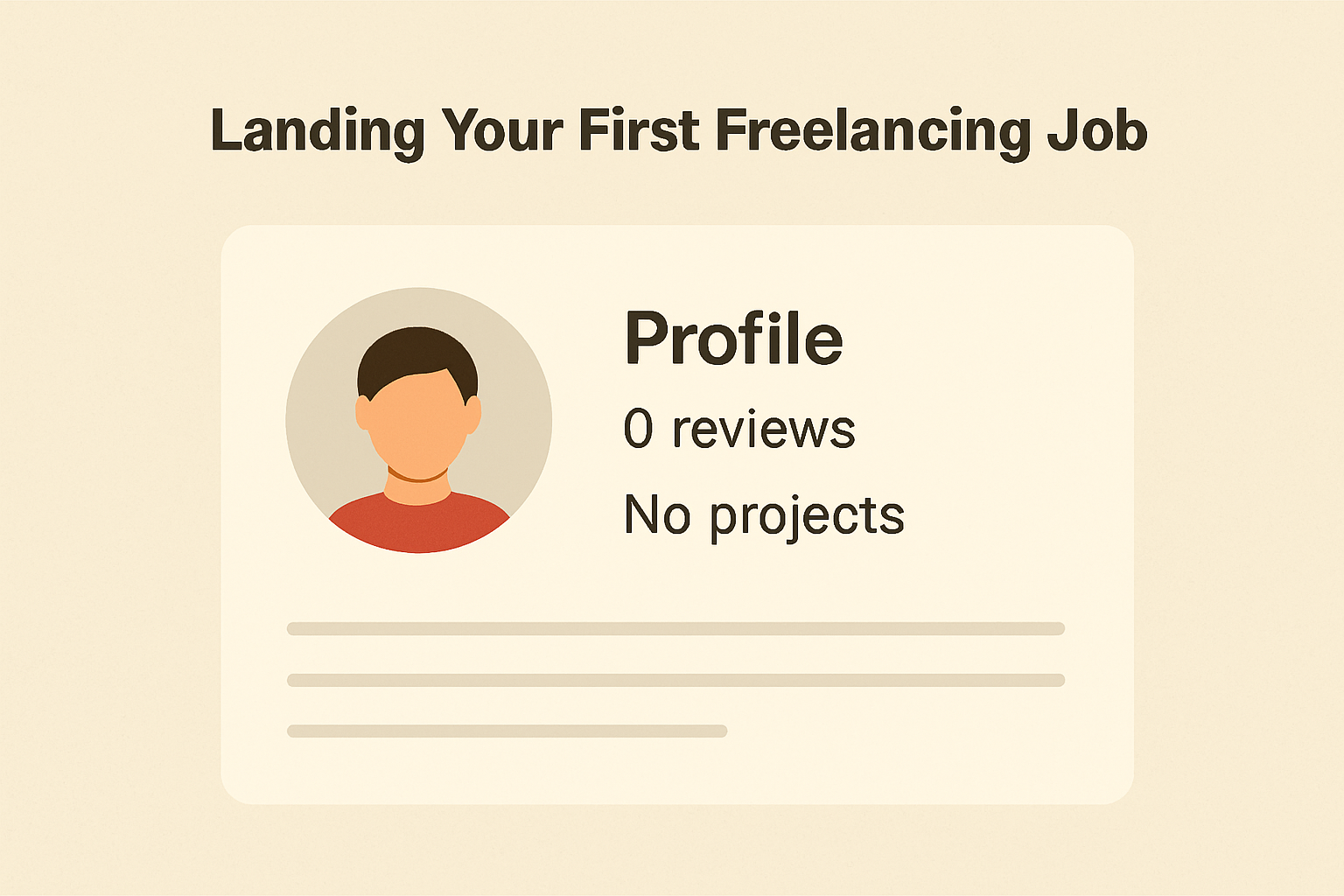
An empty profile, basically. Sure, you have listed your skillsets, maybe even your certifications. But what the clients want to see is:
What did this freelancer work on in the past? What problems did this freelancer solve?
And what they'll see is… emptiness. No past projects, no previous clients. Just a blank page.
How does that make them feel?
Trust: The Key to Get a Client to Say "Yes"
You see, two things matter most when someone decides to buy, or not buy something:
- How they feel about the product / service. For example, excitement, or enthusiasm can lead to a product being bought.
- If they trust that product, or service.
And that's what you can't offer at this time. In their mind, if you have no previous project, it's hard to trust you. How can you solve their problem if you didn't solve someone else's similar problems in the past?
It's not about trust in you as a person. It's about trust in the sense of "confidence that this person can solve my problems".
Again, it's not a "you" problem. Maybe the client needs something you think is simple. Maybe you know you can solve that problem successfully. Your abilities are there, but the trust isn't.
So that's the number 1 problem you need to solve now:
How do I make potential clients trust me?
You have a solution. It takes a bit of time. But the good news is double!
- You only need to do this once.
- This will help you get a full-time job, at a later time, if you want to. Because it also fixes the "experience required" problem that some companies post along with their job offerings. You will have that experience, and it will be provable.
After you solve this issue, it will snowball into more, and more clients trusting your services. In fact, a few months down the road, after you solve this "trust" dilemma, your new "problem" will be:
Which clients do I have the time for?
Since at that point you'll have the opportunity to work with multiple clients. And you'll actually be the one that has to accept / refuse new clients. The power shifts to you.
How to Build a Portfolio (Even with No Clients from Freelancing)
Let's say you have an account on a freelancing platform. And you just can't get any client to accept your offer. You can sidestep this problem.
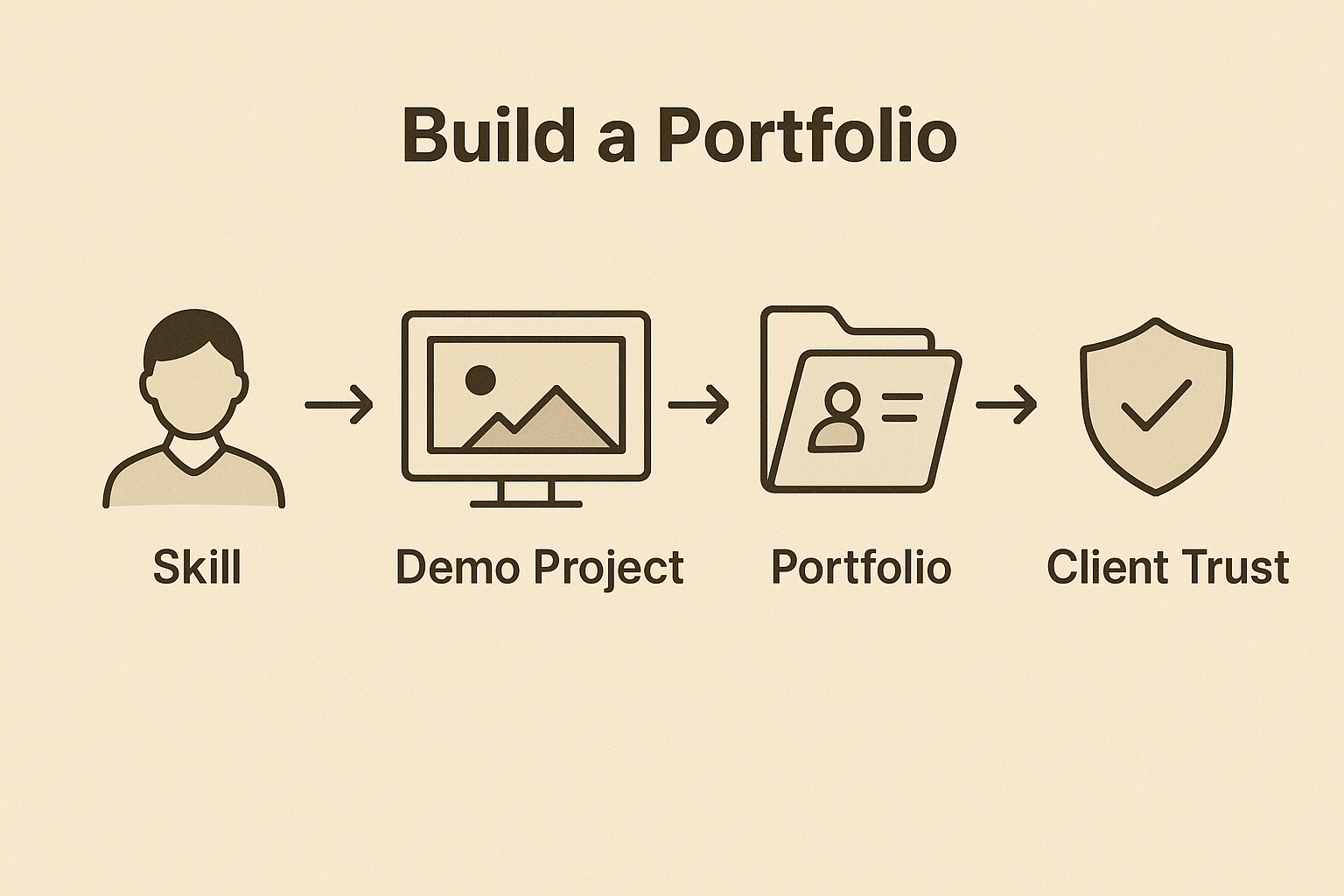
Here's an example. Let's assume you can build beautiful websites. But you just can't convince anyone on that freelancing platform to let you build it for them. Well, think (literally) outside the box.
Can't convince anyone there? Ok, then look somewhere else. Do you have offline stores in your area? A pizza place with no online website? Just think:
Who can I help in my area?
Small town, no opportunities? Then search online. Maybe a website has product photos that don't look so good. And you could make them look professional. Send an email, and three polished photos. Show them what they could get.
Whatever, wherever. Look for someone that could benefit from your services. You'll be amazed how many people in business are open to collaborations.
Just start building something cool, and useful for them. You can even do that before contacting them. Once you finish, send an email, show your project. Could be a quick, beautiful demo website. Could even be the entire project, finished.
And be honest. Tell them:
Hey, I noticed your store / restaurant / something else. And I thought you could use this website / logo / advertisement idea / software. If you think it's useful, you can keep it, and I'll help you set it up. I can even do it for free.
I won't publish this anywhere without your permission.
If you accept this offer, there's only one thing I ask in return. A mention of my name / LinkedIn page somewhere in this project.
I am doing this because I need to build a portfolio to prove to other clients / employers that I have the right skills.
Thank you for reading this email.
Add two, or three of these projects to your portfolio, and you're golden! Now whenever you apply to freelancing projects, just point clients to the websites / projects you built. Which are probably online at this point. And have your name included.
The bottom line is: All you need are 3 finished projects that look good. And proof that you built them. That will go a long way in convincing other clients that need similar things. Now they can trust you because they can actually SEE you are capable of building what they NEED.
This works for anything: Websites, C++ code, cloud infrastructures, mobile apps, artistic work, and so on.
Even in the offline world, this is true. Who would hire an architect if they can't see an example of 3 other houses they designed? But if a potential client sees 3 beautiful houses this architect designed, why wouldn't they hire her / him?
It's all about trust. It's all about clients believing that you can help them.
At one point I had zero experience with writing about Linux, my favorite subject. And I contacted a company that was looking for technical writers. It was pretty hard to get into that, at that time, at that company.
As a way to select candidates they required you to send one third of a tutorial. I sent the complete tutorial. I jokingly apologized for not following the instructions. And then I told them the truth:
- I have no experience in this field yet (technical writing on Linux subjects).
- But I love Linux with all my heart.
- I like what they do at that company.
- And I will continue to do this (write about Linux) even if they don't accept me.
They accepted me. And once they accepted me, and I could show other clients that I worked for them (and other similar companies after that), then it became easy.
Nowadays, when I apply to a similar job, it goes like this:
- I send an email (I don't even use freelancing platforms anymore; I make direct contact): "Hey, my name is… I noticed your… I can help with… Here's similar stuff I did for these companies…"
- I share my portfolio.
- They reply, ask about my availability, ideas, knowledge, and, finally, my prices.
- Then they ask when I can start.
And that's that.
A portfolio is gold! Proof that you CAN. And it also showcases the quality of your work. No client will say no to that, if they actually need what you provide.
Of course, "quality" is the keyword here. Without quality, it's hard to convince anyone. But if the quality is there, you're golden.
Which brings us to the next topic.
Do What You Love, to Quickly Develop Your Skills
Let me ask you some questions. You want to be a freelancer. Do something, and get paid. Would you do that same "something" for free? At least for a week? And if you would do that for free, for a week, would you love it, or hate it?
Now this is not the same fluff you hear everywhere: "Do what you love because then you would never work a day in your life."
I recommend you do what you love for very, very practical reasons: Unbeatable skills!

You see, when you do what you love, you put in 100% of your attention, and effort. Why is someone a prodigy at playing the violin, while someone else can barely play that instrument? People say it's "talent". But if you closely look at it, you'll see this:

- Person A, who loves playing the violin, practices every day, for years. Because they just can't wait to go home and do that! If they have 3 hours of free time, they will put all of it into practicing. Because, for them, it's fun! So they invest a lot of time into that skill. And their skill grows, exponentially.
- Person B, who doesn't really like it: What will they do? They will dread it. "Aaaah… I have 3 hours free. And I have to play the violin. Hmm, I'll watch a movie first, then go practice."
See the pattern with person B? They will simply put less time into it. Less time equals less skill; more time, more skill.
That's why you should do something you love, as a freelancer. Because, after a while, you will be ahead of the competition.
Believe me, if you love what you do, in less than one year, you'll be ahead of 95% of other people that do the same kind of work. I saw it again, and again. You can tell when someone worked on something they hate. The quality just isn't there. The skill is also lacking. The project is semi-broken.
If you do what you love, it's a guarantee that you will be excellent at what you do. And (high-quality) clients will love your work. They'll want to keep working with you. And, sometimes, they'll even recommend you to others.
It will just become easy to do that work. And easy to find new clients.
How to Find Projects Where Clients Respond More Often
Ok, you now have a portfolio. And you even have a few finalized projects listed on your freelancer profile. But you notice a new problem: You apply to 10 projects, and just one person answers… if you're lucky! What gives?
I'll admit, this one took me a long time to figure out. I even offered clients half the solution in the project proposal message. To prove I already know how to fix their problem. And still, no answer. It was weird.
I checked my profile...
Is there something wrong with it? Are the prices too high? What the hell is happening? This doesn't make sense.
I mean, if I send an email to a total stranger, I get an answer 90%+ of the time. There's usually no answer only in edge-case situations: The page is too old, and the email on it is no longer valid. The client is no longer working on that project, and doesn't need anything in that area.
But I do get answers to most emails. And once I get an answer, the success rate is almost 100%. I will usually work with that client that responded.
So why was my reply rate like 5% on freelancer platforms?
And then I stumbled on the answer by mistake…
The projects I was interested in were rare. People were posting 2, or 3 of those every month. I switched tactics, and started searching for projects that appear more often. And, surprise: I got answers much more often.
Then it clicked. It was so simple. How could I not notice it earlier?
The Semi-Hidden Factor: Project Age
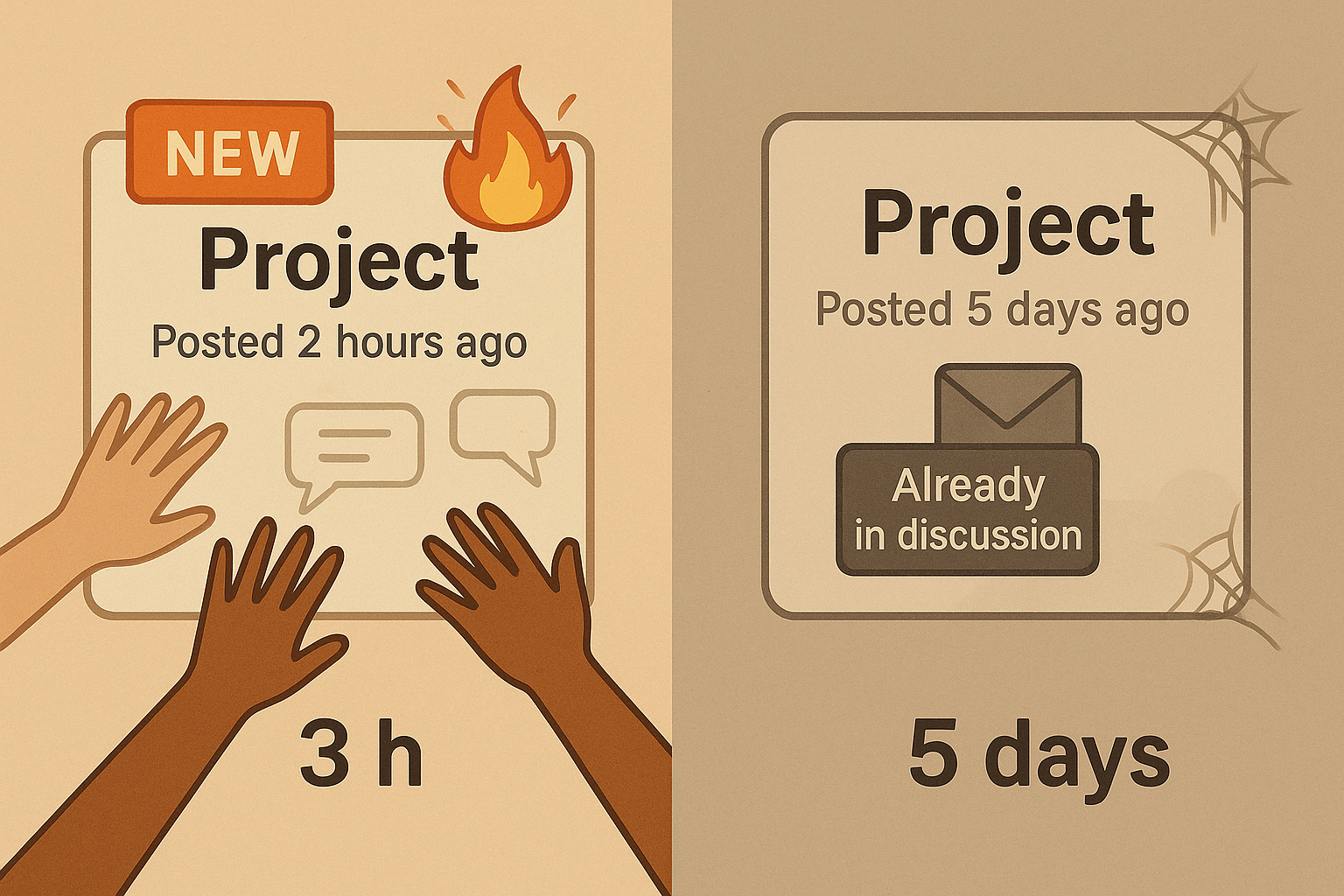
The projects that I got an answer from were almost always recent projects. When I was sending messages to those rarer projects, those were posted 5, 6, 7 days earlier. But these (more-often appearing) projects were posted 6 hours ago, 8 hours ago. And bam! People answered.
Now that I noticed that, it made total sense. You see, clients have problems. And they need solutions. And they need them now! Not one week later.
So the process goes like this:
- Client posts a project with a problem they need fixed.
- Freelancers immediately bombard that project with offers.
- Since the client needs a solution NOW, they will chat with those freelancers as soon as possible.
If a project is 5 days old, that client already got tens of offers. And maybe they already chatted with 3 people, or more. They won't sit around chatting with 100 freelancers. If they think someone can fix their problems NOW. The first freelancer that catches their eye, they'll already start working out a plan. By the time you send your message, it's too late.
If that project is 5 days old, you could think of it as 5 weeks 🙂.
The solution: Find FRESH projects, posted TODAY, if possible. Even a 12-hour project could be "too late".
Of course, there are exceptions to this rule. For very complex projects that very few freelancers can execute, you still have a chance. But for projects that can be done in less than one month, slim chances. And some projects can be finished in one week, or one day. Almost impossible to land an offer on those, if you don't contact the client in the first few hours.
Secret Tip to Spot Bad Clients
After you work with tens of clients, you start to notice patterns. Here's one I noticed, that works every time. And that has helped me avoid wasting my time, energy, and emotions with the "impossible, always unhappy" clients. That, to top it all off, also pay in peanuts.
The worst kind of client asks for the price FIRST.
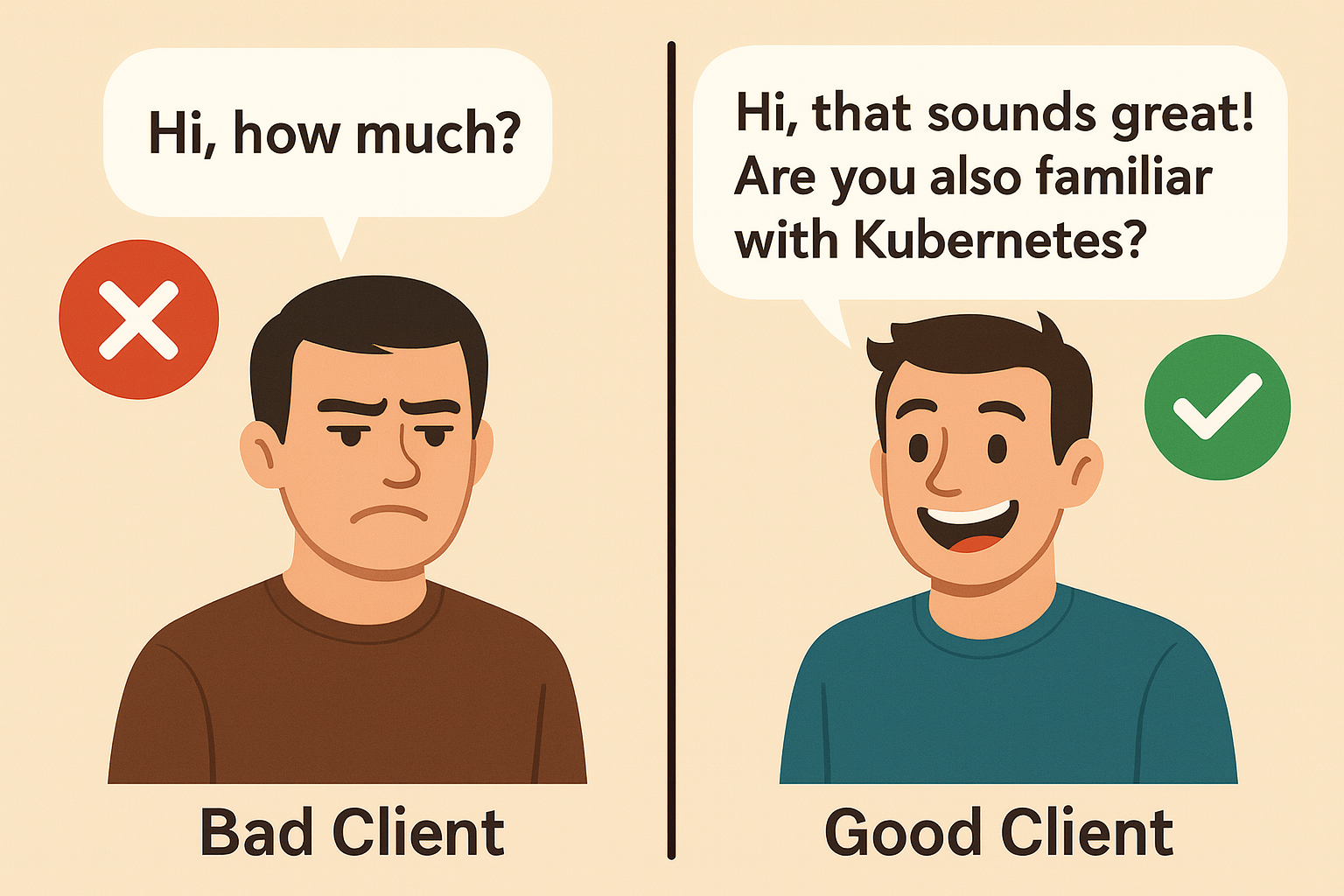
They lead with that. They don't even know yet what you did in the past. What your skills are. How much time this will take. What you will deliver. How the quality will be. No. All they want to know in the first second is:
How much?
Now you might be thinking: "Come on bro, it's normal to ask for the price. Can't have any surprises. You have to know if you can afford it."
Yes, that's not a problem. The problem is that they LEAD with that. The absolute first thing they ask in a chat, or email. That's a huge issue.
First of all, you have to wonder:
Why is this person NOT interested in anything project-related, first? Don't they want quality? Don't they need to know when this will be finished? Don't they need to know if you fixed similar problems in the past? Don't they need to ensure that you have the right skillset? So that they don't waste time?
The psychology behind this kind of client is that they don't want a solution of high-quality. They just want low cost. Again, everyone wants the lowest cost possible. That's normal. What is not normal is that quality is the LAST thing on their mind.
Just think about it… You pay rent? Would you live anywhere, as long as the rent is $30? Or do you have some standards? Like, "Ok, I want the lowest possible rent, but as long as it's not rat-infested. Or as long as there's hot water, electricity, etc."
Well, this kind of client I am talking about isn't interested in these things, project-wise. You should never work with such people. If the first thing they ask you about is price, just end the discussion there.
If they ask about price in the second, or third message, it's better. If they ask about price in the last message, after they discussed project details, quality, time required, that's ideal!
Long story short:
- High-quality clients will ask about the price as the last (or almost last) thing in your discussion.
- Low-quality clients will ask about the price in the first (or almost first) thing in your discussion.
And here's another secret that almost no one writes about.
Fair-Pay Clients Are Reasonable
High-quality clients are often happy with the end-result. They are flexible, understanding. Always looking for friendly, constructive ways you can both increase the positive impact of the project.
As long as the quality from you is there, they will be satisfied, and also grateful. Because that's what they were looking for in the first place: Quality. And they appreciate that quality. As they see the value in what they get.
Cheap Clients Are Always Unsatisfied
Low-quality clients on the other hand: They are always unhappy. They are never satisfied with the end result. They always blame you for everything. And there's NOTHING you can deliver for them to go:
Ok, this looks super-good. Thank you!
Sounds familiar?
Psychologically, I think it makes sense. First of all, low-quality clients don't value what you offer. That's why they want to pay $100 for a $1,000 project. Or $50 even, if they can scam you into it.
Since what you do is of no worth to them, of course they won't be happy with what you offer. They wanted something that they consider worthless anyway. They get that something, it's still worthless, right? It was that way in their mind long before you even began.
So identify low-quality clients with the technique I described in the earlier section. And just never work with them. It's never worth it. They cause too much headache.
Low Prices Work Against You
Oh, and another super-secret tip: Don't sell yourself short. As in, if you know it's industry practice for something to be charged $1,000, don't sell it for $200. Just as a way to "convince" clients to buy from you. And "outbid" the other freelancers.
It doesn't work with high-quality clients. You know why?
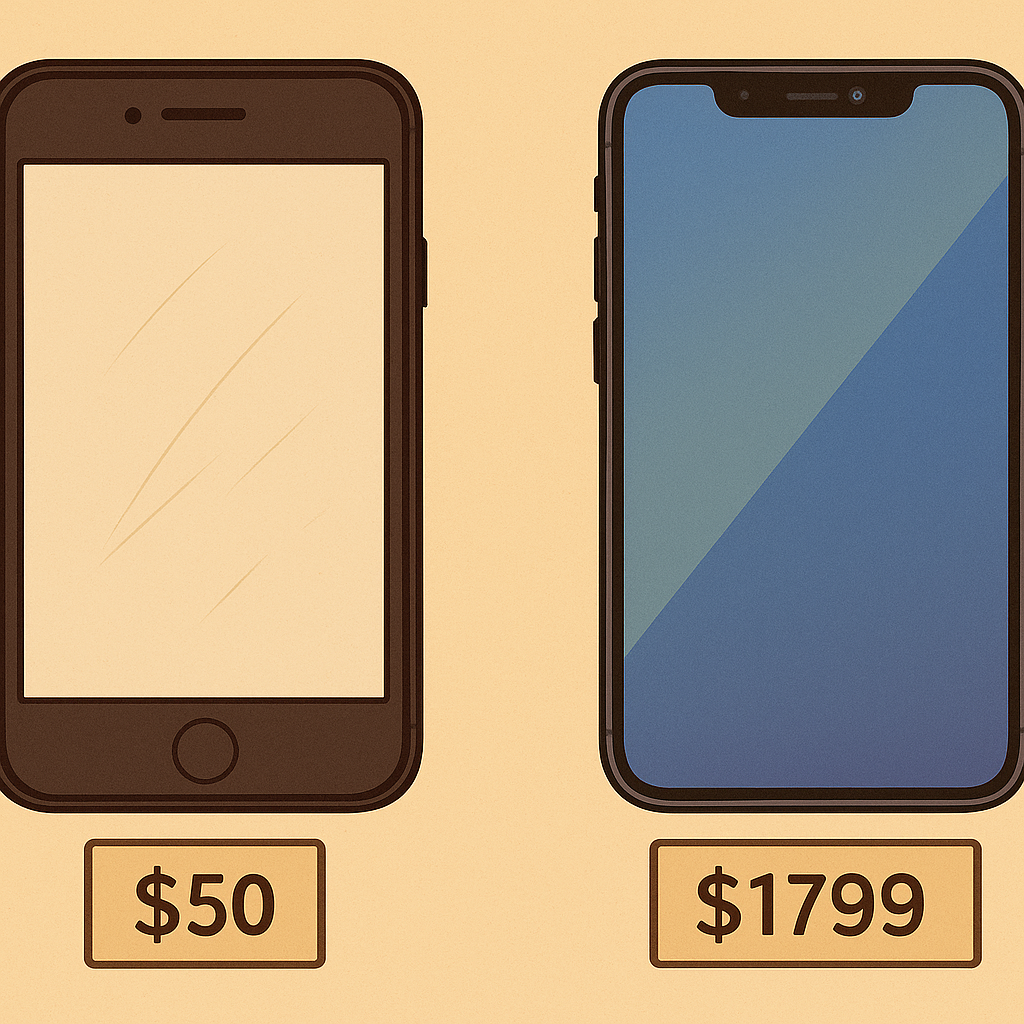
It looks suspicious. All they'll do is wonder: Why are you charging 20% of what it's worth? Maybe because you're not good enough? Maybe because your solution is low quality? It looks fishy. It makes them trust you less.
I mean, just imagine you see a new smartphone being sold for $50. How would YOU feel about it? Would you think it's a good phone? 🙂
High-Quality Clients Notice High-Quality Work
If you worked with low-quality clients in the past, this might not seem true. You might be thinking:
No, they don't notice, or appreciate my effort!
You worked hard on something, delivered very good work, and the client didn't care. Well, that's the cheap, low-quality client we talked about.
But high-quality ones? Oh, do they notice your super-polished work! You know why they notice it? Because it's rare.
You see, if you're skilled at what you do, and you offer excellent results, as a freelancer, you have a problem. It's hard to find good clients.
But you know what? The high-quality clients have the exact same problem. It's extremely hard for them to find people like you. Freelancers that care. And that put in the time and effort to deliver something excellent.
In my line of work, I saw people apply to companies, or freelance projects. Sometimes, it's extreme: I saw freelancers actually apply to jobs, and they didn't even fill in their email. No way to contact them. They couldn't even figure that out. How will they work on a complex project? What attention to detail? No chance they'll even get it halfway done.
Then there's the "half (almost) good, half-bad" kind of freelancers. Unfortunately, most are like this. For the reason we discussed earlier: They just don't like what they do.
They finish the work, but it's such a mixed bag, you have to hire a second person to fix what the first one did. Imagine how you would feel, if you would have to pay $1,000 for someone to do something. And then another $1,000 for another person to fix that… You might have had this experience with a dentist, or car mechanic. So you know how it is.
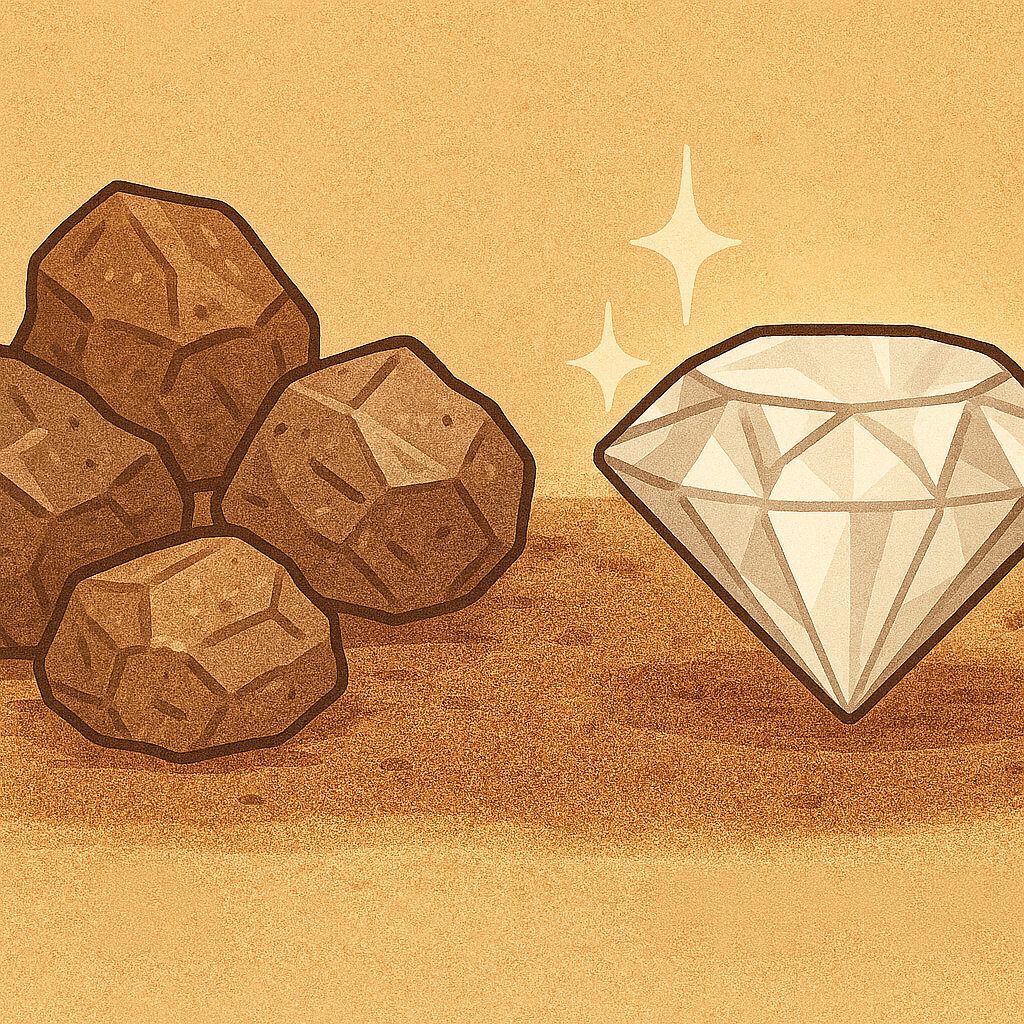
But sometimes… just sometimes, there's someone like you! They went the extra mile. Polished a bit here, a bit there. Re-worked something they weren't quite happy with. And you can just see, as a client, that it's DIFFERENT. It just shines. It's noticeable, like a polished diamond between a pile of rocks.
After you see low-quality work 20+ times, when someone finally comes along and delivers high-quality work, it truly stands out! You just can't not notice it! You simply see it's different, and good, and made with love, respect, passion; and skill, of course.
So after a high-quality client worked with 20 less-than-ideal freelancers, you think they just won't care about you? The person that delivers high-quality work? Something they were looking for, for months?
They will notice. Just keep up the high-quality work, pick the right clients, and it will all work itself out. Believe me.
To sum it up: Avoid bad clients. Search for good clients. Deliver quality.
And you now know how to spot those bad clients. Skipped that section? Go back, and read it. It's super simple to identify them.
Sell Solutions, Not Skills
In our last section, let's discuss a mistake I see often. It's not really high-impact; you can still get away with it. But if you improve this, it will become slightly easier to find the right clients.
You see, on CVs, and on freelancing websites, I notice this common mistake: People just listing a long number of skills. Just tech words with no context.
JavaScript, Node.js, backend, frontend, blabla.js, blabla framework.
You get the picture.
If I read this, as a client, it does not tell me a story about you. It does not tell me what you actually went through in your professional experience. How you used those tools, what you built, how you solved problems, how you evolved. It does not tell me WHO you are, and what you can do.
To build an extreme example: Imagine you are looking for a translator. And all you see on their CV is:
English
French
What does this tell you about their abilities? Not much, right? So isn't "JavaScript, Node.js, backend, frontend" exactly the same? 🙂
Maybe in a CV it matters… maybe. Because people that hire might filter out by that skillset. Although it's a mistake for the HR departments that do that. Because writing a bunch of skillsets is easy to do. Sure, they test candidates afterwards. But a lot of time is wasted accepting to interview people that just lied. And wrote a bunch of words on paper. To the HR departments: Ask people what they did (and have proof of), not what they say they know.
Optimize Your Freelancer Profile
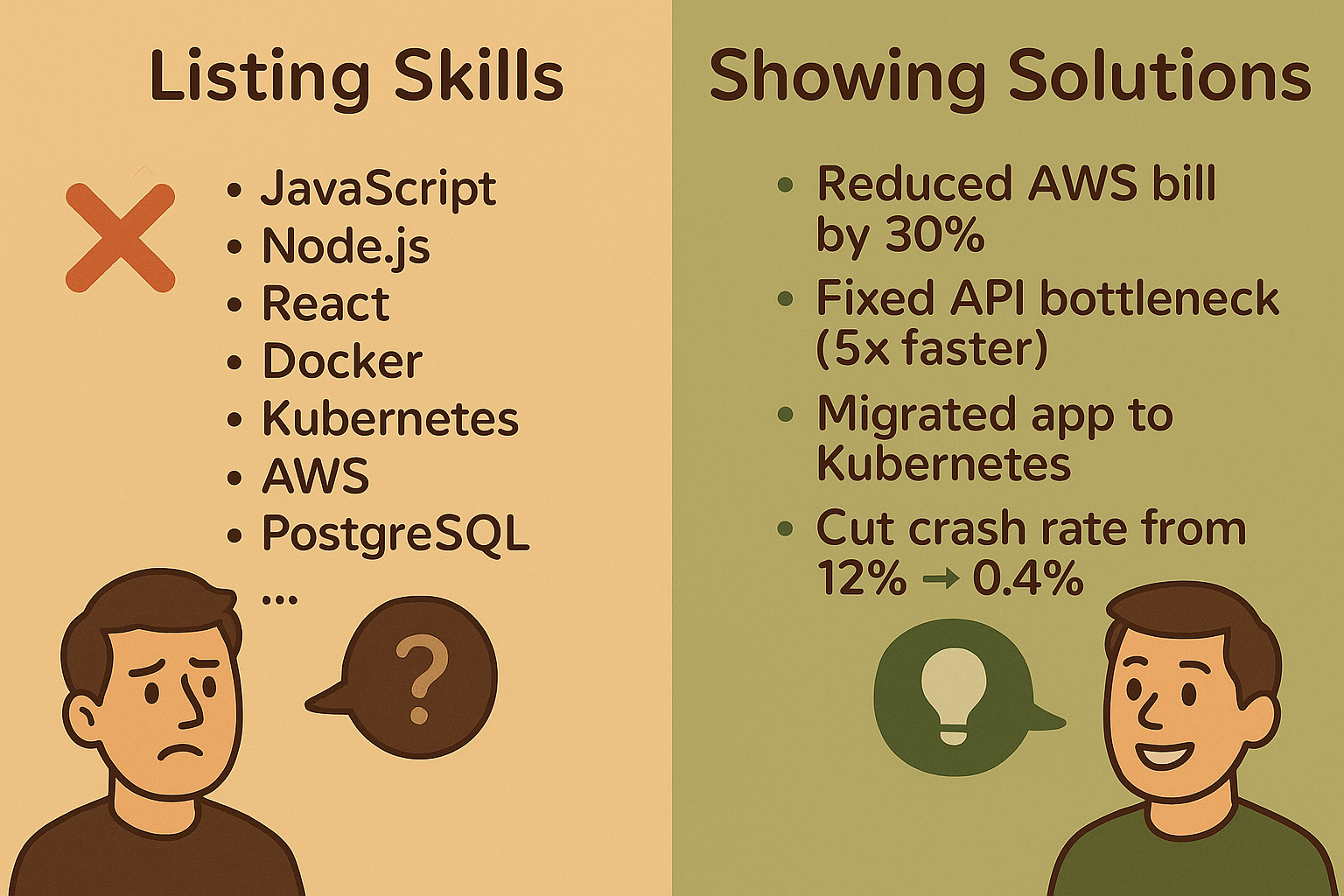
On a freelancer profile, just listing a bunch of technical skills is usually a mistake. You know why? Clients that need to hire you aren't even entirely sure how that stuff works. If they would 100% know how it works, they could do it themselves.
Ok, maybe some of them know, but do not have the time to do it themselves. But that's not usually the case.
So this is like me reading that someone worked with a particle accelerator, and focused on studying gluons. I don't even know, can you do that with a particle accelerator? And what exactly is a gluon? I have no idea.
You can list skills, but not without CONTEXT.
Your focus should be to list the PROBLEMS you SOLVED, on your freelancer profile. Because, as a client, isn't that what I would want to see? I have some problems. I need solutions. Can you solve my problems?
If your profile can prove that to me, I'm already jumping into the chat with you. Why wouldn't I? You fixed problems that I need fixed.
Want an example? Say someone is running a Kubernetes cluster. Their current problems: Big containers, high CPU usage. What would impress them?
- That you have "5 years experience with Kubernetes?"
- Or that you "Reduced CPU usage in Kubernetes containers by 40%. Costs reduced by 30% in AWS bill." on some previous project?
If they're paying $100,000 per month on AWS, this means you could save them $30,000 (each month!). Is it worth it to pay you thousands of dollars for that? Of course. And it's something they can understand, what you did there. "5 years experience with Kubernetes" means nothing to them. It doesn't specify what you can do for them.
Conclusion
I hope this helps you on your own freelancing journey. And just in case you're looking to upgrade your skills in the areas of:
- Linux
- Containers / Docker
- Kubernetes
- Cloud architecture
- DevOps practices
- And more
Know that we have a wide range of easy-to-understand courses available:

Good luck on your freelancing journey! And see you in the next blog.



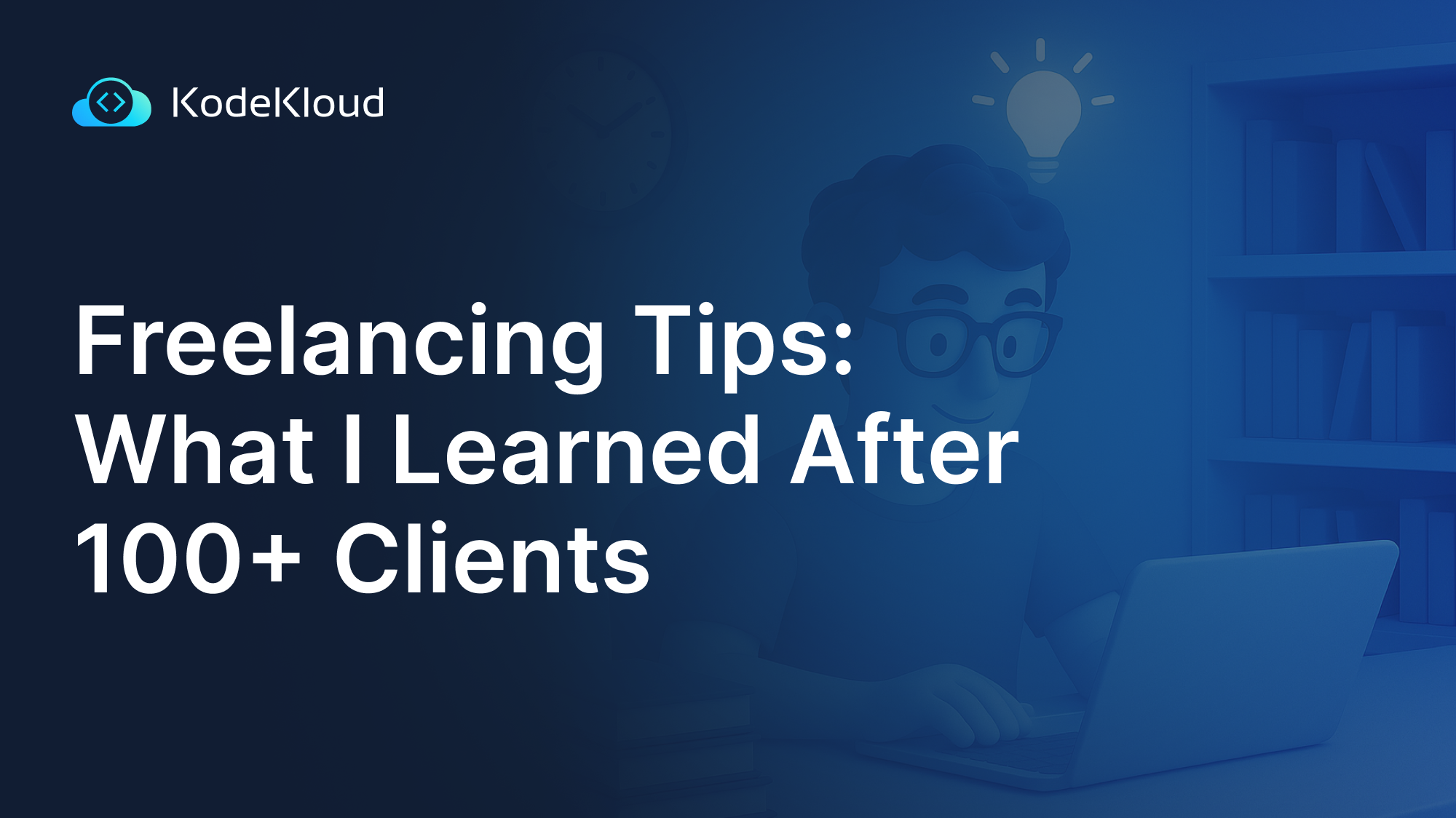












Discussion